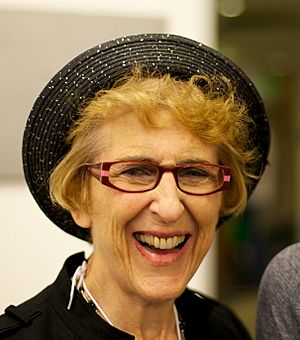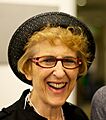Carol Ruth Silver facts for kids
Quick facts for kids
Carol Ruth Silver
|
|
|---|---|

Silver in 2012 in San Francisco
|
|
| Member of the San Francisco Board of Supervisors from District 6 | |
| In office 1978–1980 |
|
| Preceded by | District created |
| Succeeded by | Districts abolished |
| Member of the San Francisco Board of Supervisors at-large | |
| In office 1981–1989 |
|
| Preceded by | Districts abolished |
| Succeeded by | Terence Hallinan |
| Personal details | |
| Born | October 1, 1938 Boston, Massachusetts |
| Political party | Democratic |
| Residence | San Francisco |
| Alma mater | University of Chicago |
| Profession | attorney |
Carol Ruth Silver (born October 1, 1938) is an American lawyer and civil rights activist. She is known for being a Freedom Rider. This meant she rode buses into the southern United States to challenge unfair segregation laws. She was arrested and spent 40 days in jail for her actions.
Later, as a member of the San Francisco Board of Supervisors, she was a target in a terrible event. However, she was not in her office at the time and was safe.
Contents
Early Life and Education
Carol Ruth Silver grew up in a Jewish family in Worcester, Massachusetts. She went to the University of Chicago, where she earned her first degree in 1960. She then earned a law degree in 1964. She also studied at the John F. Kennedy School of Government at Harvard University.
Career Highlights
After finishing her education, Silver moved to California. She taught at several universities, including Golden Gate University School of Law and San Francisco State. She also worked with the California Rural Legal Assistance program, helping people with legal issues.
Freedom Riders: Fighting for Equality
In 1961, Carol Ruth Silver became a Freedom Rider. These brave civil rights activists rode buses into the South. They wanted to challenge racial segregation, which meant people of different races were forced to use separate facilities. The Freedom Riders deliberately used facilities marked for the "other" race to show these laws were unfair.
Silver remembered her experience: "On June 2, 1961, I got on a bus in New York bound for Jackson." She explained that when she arrived in Jackson, Mississippi, she walked into the bus station waiting room marked "Colored." She was arrested almost immediately and taken to jail.
She was sentenced to six months in jail. However, she was released after serving 40 days. In 2011, on the 50th anniversary of the Freedom Riders, she appeared on the Oprah Winfrey Show. She shared her story about being a Freedom Rider. In 2014, she wrote a book about her experiences called Freedom Rider Diary: Smuggled Notes from Parchman Prison.
Political Journey
Carol Ruth Silver started her political career in 1970. She first ran for city auditor in Berkeley. She then moved to San Francisco. There, she ran for a seat on the city's Board of Supervisors. The Board of Supervisors is like a city council. Its members help make important decisions for the city.
Her election in 1977 was part of a big change for the San Francisco Board. More diverse people were being elected. Silver was noted for being the first "unwed mother" on the board. This showed a shift in who could hold public office.
Silver said in 2011 that she and her colleague, Harvey Milk, helped change power in San Francisco. They helped bring younger people and those from different communities into city leadership.
A Difficult Time in San Francisco Politics
In 1978, a former city supervisor named Dan White was involved in a tragic event. He shot and killed San Francisco Mayor George Moscone and Supervisor Harvey Milk. Years later, a police detective said that White had planned to harm others too. Carol Ruth Silver and state assemblyman Willie Brown were reportedly also targets.
Luckily, Carol Ruth Silver was not in her office when the shootings happened. Willie Brown had also just left the building. This meant they were safe.
During the legal process that followed, Silver spoke for the prosecution. She said she did not believe White's claim of being mentally unwell. She continued to believe that White's actions were planned.
After the news of the verdict, there were public protests in the city. During this time, Silver was injured by an object. In 1998, she shared her thoughts again. She said she always believed Dan White had planned his actions. She also said she now believed he had intended to harm her.
Supporting Gun Rights
Carol Ruth Silver has also spoken about the right to own guns for self-defense. In 1985, she wrote an article in The Wall Street Journal. She argued that people have a right to defend themselves, especially if they feel threatened. She believed that responsible adults should be able to own guns for protection.
She also wrote a book called Self Defense Handgun Ownership and the Independence of Women in a Violent Sexist Society. In this book, Silver argued that owning guns could help women. She believed it could give women the ability to live safely and independently. She felt that throughout history, women often relied on men for protection. Access to firearms, she argued, could change this.
Later Career and Community Work
Carol Ruth Silver served three terms on the Board of Supervisors. She stepped down in 1989. She later ran for a seat in the U.S. Congress in 1996 but was not elected. She also ran for supervisor again in 2000.
After leaving politics, Silver focused on helping her community. She founded the Chinese American International School in San Francisco in 1982. This was the first school in the U.S. to offer a full program in Mandarin Chinese.
In 2002, she traveled to Afghanistan. She wanted to find ways for American citizens to help the Afghan people. She has since started or helped start three organizations. These groups work to support education in Afghanistan, especially for women and girls.
In 2007, Silver was appointed director of the San Francisco Sheriff's Department's Office of Prisoner Legal Services. She left this role in 2009. She later supported an organization called Law Enforcement Against Prohibition. This group advocates for changes in drug laws.
Images for kids
 | Shirley Ann Jackson |
 | Garett Morgan |
 | J. Ernest Wilkins Jr. |
 | Elijah McCoy |


